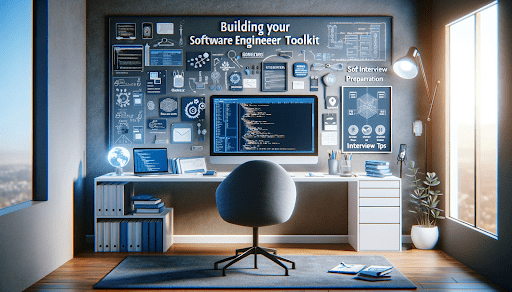The path to becoming a software engineer is marked by continuous learning, growth, and endless lines of code. However, before you can set out on a rewarding career in this domain, you need to navigate the demanding landscape of technical screening interviews. Your performance in these interviews can significantly influence your trajectory within the industry. Within the pages of this all-encompassing guide, we will plunge into the realm of technical screening interview preparation, uncovering the tactics, tools, and insights that will pave the way for your success.

Section 1: Navigating the Software Engineer Interview Landscape
1.1. Diverse Interview Approaches
In the realm of software engineer interviews, comprehending the multifaceted landscape is paramount. Interviews in this field encompass a range of formats, including technical interviews, behavioral interviews, and system design evaluations. Our discussion will delve into the distinctive characteristics of each interview type and offer valuable insights on how to prepare for them effectively.
1.2. Varied Interview Structures and Tools
Software engineer interviews are conducted through a myriad of structures, such as initial phone screens, hands-on coding challenges, in-person whiteboard sessions, and take-home assignments. Each format demands a unique approach. Here, we will dissect each structure, shedding light on the best practices to navigate them with confidence. Whether it’s tackling algorithmic problems on a whiteboard or crafting elegant code for take-home assignments, we’ve got you covered.
Section 2: Preparing for Software Engineer Interviews
2.1. Strengthening Your Technical Skills
The heart of software engineer interviews lies in evaluating your technical proficiency. In this section, we’ll delve into the fundamental technical aspects you need to grasp, encompassing data structures, algorithms, and programming languages. Additionally, we’ll unveil effective strategies to enhance your coding prowess and offer valuable resources for hands-on practice.
2.2. Behavioral Interview Preparation
Behavioral interviews serve as a means to assess your soft skills, communication aptitude, and alignment with the company’s culture. Here, we’ll provide essential guidance for preparing for questions that delve into teamwork, problem-solving abilities, and conflict resolution. Furthermore, we’ll explore the STAR method (Situation, Task, Action, Result), a valuable tool to construct compelling responses to behavioral inquiries.
2.3. Mastering System Design Interviews
System design interviews test your ability to craft scalable and efficient systems. This section will dissect the core components of system design interviews, offering real-world examples to illustrate key concepts. We’ll equip you with tips and strategies essential for excelling in this distinct interview format.
2.4. Navigating Coding Challenges and Whiteboard Interviews
Coding challenges and whiteboard interviews necessitate on-the-spot problem-solving. Discover strategies to approach these dynamic assessments effectively. We’ll unveil problem-solving techniques, discuss the art of organizing your code efficiently, and provide insights into effective communication with interviewers during these high-pressure scenarios.
2.5. Excelling in Take-home Assignments
Take-home assignments provide you with an opportunity to showcase your coding skills at your own pace. Learn how to manage your time efficiently, craft clean and maintainable code, and present your solution in a manner that effectively highlights your capabilities.
By mastering these core facets of software engineer interviews, you’ll be better prepared to excel in the technical evaluations, behavioral assessments, and system design challenges that stand between you and your dream job.
Section 3: Building Your Software Engineer Interview Toolkit
As you embark on your journey to prepare for software engineer interviews, assembling the right toolkit is crucial. In this section, we will explore essential resources and strategies to help you build a robust foundation for success.

3.1. Online Resources and Courses
In today’s digital age, a plethora of online resources and courses are available to help you strengthen your software engineering skills. These resources encompass coding platforms, algorithm courses, and interview-specific websites, each tailored to enhance your expertise.
Coding Platforms: Websites like LeetCode, HackerRank, and CodeSignal offer a vast collection of coding challenges that mirror the types of problems you might encounter in technical interviews. Regularly practicing on these platforms will sharpen your problem-solving abilities and coding skills.
Algorithm Courses: Online platforms like Coursera, edX, and Khan Academy offer algorithm courses taught by renowned professors and industry experts. These courses delve deep into data structures, algorithms, and problem-solving techniques, providing you with a strong theoretical foundation.
Interview-specific Websites: Dedicated interview preparation websites like Interviewing.io and Pramp offer interactive coding interviews with real engineers. These platforms enable you to simulate interview scenarios and receive valuable feedback from experienced professionals.
3.2. Books for Interview Preparation
Books remain a timeless resource for honing your software engineering skills. Consider exploring recommended books that cover a wide range of topics relevant to interviews, including algorithms, data structures, coding interviews, and system design.
Some noteworthy titles include “Cracking the Coding Interview” by Gayle Laakmann McDowell, which provides a comprehensive guide to technical interviews, and “Introduction to Algorithms” by Thomas H. Cormen, Charles E. Leiserson, Ronald L. Rivest, and Clifford Stein, which serves as a foundational reference for algorithmic knowledge.
3.3. Coding Practice Platforms
Coding practice platforms are invaluable for hands-on learning and skill development. These platforms offer a structured environment where you can tackle coding challenges, enhance your problem-solving abilities, and bolster your coding skills.
Popular coding practice platforms such as LeetCode and HackerRank offer a diverse array of problems categorized by difficulty levels and topics. By consistently engaging with these platforms, you can gain confidence in your coding abilities and develop efficient problem-solving strategies.
3.4. Mock Interviews and Peer Review
One of the most effective ways to prepare for software engineer interviews is to engage in mock interviews and seek peer feedback. Mock interviews replicate real interview scenarios, helping you become familiar with the interview process and reduce anxiety.
Setting up mock interviews can be done with the help of friends, mentors, or interview preparation platforms like Interviewing.io. Participating in these mock interviews allows you to receive constructive feedback on your performance, identify areas for improvement, and refine your interview skills.
Collaborating with peers for peer review can also be highly beneficial. Sharing your solutions to coding challenges and receiving feedback from others can lead to valuable insights and alternative approaches to solving problems.
Section 4: Mastering the Software Engineer Interview
4.1. Efficient Time Management
Efficiently managing your time is a critical aspect of interview preparation. Discover effective time management techniques that allow you to make the most of your study sessions while reducing stress. Prioritize your study materials, set achievable goals, and create a study schedule that aligns with your strengths and weaknesses.
4.2. Navigating Interview Etiquette
Navigating interview etiquette is essential to make a lasting impression on your potential employers. Gain insights into the dos and don’ts of interview etiquette, encompassing everything from dressing appropriately to communicating effectively. Learn how to present yourself professionally and engage with interviewers respectfully to create a positive impression.
4.3. Sharpening Problem-solving Skills
Problem-solving skills are at the core of software engineering interviews. Explore effective strategies that will empower you to tackle intricate technical questions with confidence. Learn how to break down complex problems, devise clear and efficient solutions, and communicate your thought process effectively during interviews.
4.4. Embracing Rejections and Feedback
Receiving rejection is an inherent part of the interview process, and it’s crucial to handle it gracefully. Discover guidance on how to embrace rejection as a learning opportunity rather than a setback. We’ll provide insights on gathering constructive feedback, analyzing it objectively, and using it to enhance your skills and refine your interview performance. Remember, each rejection can bring you one step closer to your dream software engineering position.
Read more about:
Assessing Dependent Personality and Skills with an AI-based tool
What Exactly Does an AI-Based Talent Assessment Test Refer To?
The Complete Guide to Skill Assessment Tests for 2023
Conclusion
Preparing for software engineer interviews can be a daunting task, but with the right approach and resources, you can increase your chances of success. This comprehensive guide has equipped you with the knowledge, strategies, and tools to tackle technical interviews, behavioral assessments, and system design evaluations with confidence. Remember, interview preparation is not just about passing a test; it’s about gaining the skills and knowledge that will serve you throughout your software engineering career. So, roll up your sleeves, start practicing, and embark on your journey to becoming a successful software engineer.



